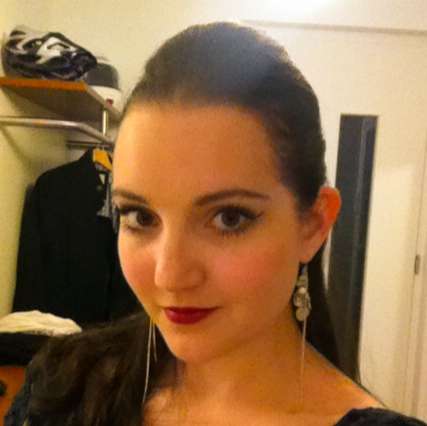Mariinsky 2, the most expensive opera house in the world, is remarkable for its elegant simplicity. The whole architecture is predicated on achieving the best possible acoustic, the success of this project being obvious from the moment you hear the first notes of the orchestra. In point of fact, that’s precisely what’s required for this Traviata.
Unfortunately, in Acts I and II, the performance was spoilt by unusual noises. These were evidently coming from the stage, and sounded somewhat like the distortion of frequency when someone on the phone is too close to the loudspeaker, followed by an unpleasant crackling. It was not clear what was the exact source of the noise, but the fact is that it was not very nice to listen to. Only in Act III did it become possible to enjoy the music free from such disturbances, which seriously detracted seriously from the performance as a whole.
Charles Roubaud’s staging is classic, unspectacular and beautiful to look at, although it can seem somewhat dull compared to successful modern productions. The acting direction was principally limited to wringing of hands, lying around, walking around the stage and embarrassed glances. Only in the last scene, in which Violetta dies alone, the white curtains falling around her bed, having been deserted by all present, is there a compelling effect both visually and dramatically.
At the start, Mikhail Sinkevich’s conducting was highly expressive – the overture was marvellously melancholic and presaged Violetta’s unhappy fate. Just as successful was the prelude to Act III, with heart-rending strings. On the other hand, the Tempo of Germont’s “Di Provenza” was “interesting” – and not necessarily in a good way. Clearly, Sinkevich must have imagined Germont returning from Provence in a hurry, so rapidly did he rush through the aria. Otherwise, conductor and orchestra were very much restrained and unobtrusive: they accompanied the singers well, but without adding any specific character. One might have wished for more softness and emotion in the duet between Violetta and Alfredo, and more drama in that between Germont and Violetta. And sadly, the seething mood of Violetta’s “Amami, Alfredo” was altogether lost, as was the tempestuous explosion.
In an evening that was disappointingly average, the principal singers were considerably more compelling, most of all Maria Bayankina as Violetta. Singing with a wonderful slavic timbre, she perfectly mastered the coloratura of Act I. The first moment that genuinely stood out was that she didn't attempt to end the “Sempre libera” with the high E flat, which wasn't actually composed by Verdi and which, in my opinion at least, falls into the category of “unnecessarily showy”. In Act I, you could already tell that Bayankina would be more at home in the dramatic passages of Acts II and III – and that’s exactly how it turned out: with each scene she rose above the previous one as her voice continually switched between loud and soft, never straining, with no sign of excessive vibrato. Especially touching, juxtaposed with an “Addio del passato” imbued with desperation, was her flaring up of hope that accompanied Alfredo’s arrival. In acting, she wasn’t content with merely singing at the front of the stage: rather, she breathed life into Violetta with small gestures and body language. In an evening with a convincing performance from the orchestra, Maria Bayankina certainly has what it takes to be a superb Violetta.
Less enthralling but of thoroughly high quality was Dmitry Voropaev’s Italian sounding Alfredo. It was clear that he possesses a beautiful voice, capable of reaching the high notes effortlessly – in contrast to the Soprano, he would not omit the optional high C at the end of “O mio rimorso”. However, until a somewhat strained piano in “Parigi o cara”, he spent a lot of the evening in extended forte. His acting was mostly restricted to wringing of hands and a look which should have been something between miserable and jealous.
As Giorgio Germont, however, Vasily Gerello convinced in all aspects. With his well controlled baritone, he created beautiful arcs, and every sound was so natural that you never had the impression he had to overly concentrate on his singing. This vocal facility enabled him to portray the emotions of Germont with his voice alone; and he did not play him simply as an elderly father figure. Rather, he showed him as a man of good society who does what he has to without sentimentality, but also seems attracted to Violetta. Vasily Gerello’s acting also points in the direction: the way he eyed Violetta in anything but a fatherly way reveals a great deal about his interpretation of the character.
Also outstanding amongst an excellent sounding chorus were Natalia Yevstafieva as a good sounding Flora and Yevgeny Ulanov as a deep-voiced Marquis d’Obigny.
Translated from German by David Karlin




